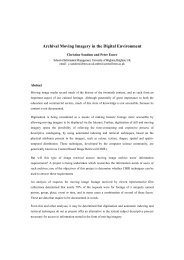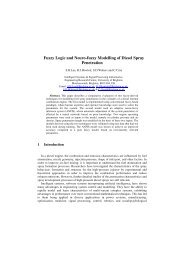Demanding Growth: - University of Brighton Repository
Demanding Growth: - University of Brighton Repository
Demanding Growth: - University of Brighton Repository
Create successful ePaper yourself
Turn your PDF publications into a flip-book with our unique Google optimized e-Paper software.
12 <strong>Demanding</strong> <strong>Growth</strong>: Why the UK needs a recovery plan based on growth and innovation<br />
substantial impact, provided it is well-targeted.<br />
We look in-depth at a particular growth area,<br />
video games, a high-growth subset <strong>of</strong> the creative<br />
industries, and show in detail the cost <strong>of</strong> support for<br />
innovation and growth. To take one example, in the<br />
Appendix to this document we have looked in-depth<br />
at the implications <strong>of</strong> a growth and innovation-based<br />
policy on a sub-sector <strong>of</strong> the creative industries area.<br />
The cost <strong>of</strong> better targeting support on this subsector,<br />
which contributes £1 billion to UK GDP, would<br />
be modest: at most £10 million, much <strong>of</strong> which could<br />
be redirected from existing spending. (See Appendix.)<br />
Both approaches bear out the case that focusing<br />
on growth and innovation is cheaper than more<br />
generalised support. We have already noted the low<br />
cost <strong>of</strong> next generation broadband compared to older<br />
network infrastructure, like airport extensions.<br />
Our proposed interventions would focus existing<br />
support and investment more tightly on key sectors,<br />
in the context <strong>of</strong> clear national economic strategy<br />
for growth. Government funding is still vital, but<br />
would amount to a fraction <strong>of</strong> the cost <strong>of</strong> current<br />
‘fire-fighting’ interventions in the financial sector<br />
and elsewhere. The table below gives a breakdown <strong>of</strong><br />
estimated, indicative costs across the sectors.<br />
The total cost for a targeted, sector-led package<br />
would be an order <strong>of</strong> magnitude less than the<br />
£120 billion that has been estimated as the cost<br />
<strong>of</strong> measures to support the financial sector, 50 and<br />
even the £5 billion needed to fund widespread<br />
broadband compares favourably with the £2.3 billion<br />
that has been used to support one sub-sector <strong>of</strong> UK<br />
manufacturers, the automobile industry. The costs<br />
<strong>of</strong> this package can be financed by redirecting and<br />
bringing forward funding, or, in the case <strong>of</strong> fibre-optic<br />
broadband, significantly reduced through NESTA’s<br />
innovative spectrum-for-speed funding proposal. 51<br />
Conclusion<br />
Refitting the UK’s economy after the slump in the<br />
financial services will require a clear sense <strong>of</strong> direction<br />
on the part <strong>of</strong> government. Finding new sectors<br />
to drive economic growth is now essential; yet the<br />
market alone will be unable to create new growth<br />
sectors in a severe recession. The case for an explicit<br />
and credible recovery plan is compelling.<br />
By learning the lessons <strong>of</strong> the past, drawing on best<br />
practice elsewhere, and heeding the voice <strong>of</strong> demand,<br />
we believe that a recovery plan for the UK can build<br />
on its genuine strengths as an economy and establish<br />
new, dynamic areas for future economic growth.

















